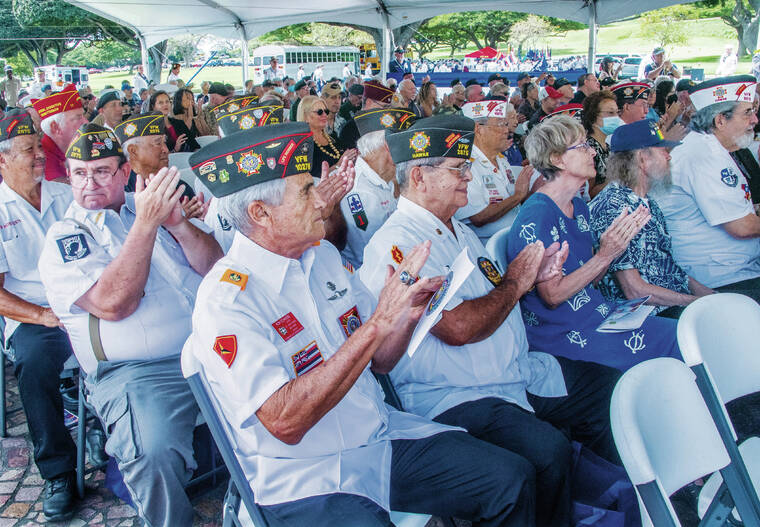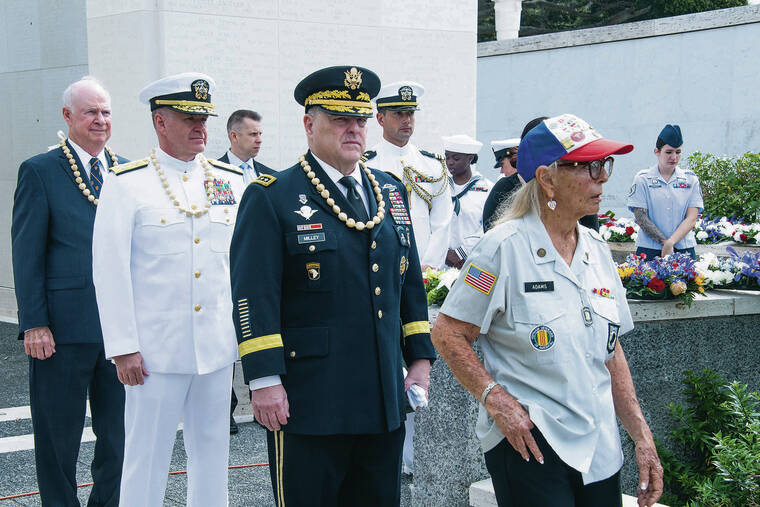National Vietnam Veterans Day was observed Tuesday at the National Memorial Cemetery of the Pacific at Punchbowl in a ceremony attended by the country’s top military leader, Gen. Mark Milley, chairman of the Joint Chiefs of Staff.
In his keynote speech, Milley reflected on how early in his military career, Vietnam veterans were his first role models.
“(It) was you, the Vietnam veterans, who trained us, all my noncommissioned officers, all my company commanders, all my battalion commanders,” he said.
“The Vietnam War did not end with the warm homecoming that our military received in World War II,” Milley continued. “Each of you in many ways were ignored, reviled and in some cases even spat upon.”
Rona Adams, president of the Vietnam Veterans of America Oahu Chapter, served in Vietnam as an Army nurse and was one of the main organizers of Tuesday’s commemoration. She recalled her own homecoming when she flew into Los Angeles.
“They didn’t spit on me there because even though I came home in uniform, they didn’t know that there was a woman in Vietnam,” Adams told the Honolulu Star-Advertiser after the ceremony.
She said that getting recognition for Vietnam veterans is particularly important for her and that she feels a strong drive to “give back.”
National Vietnam Veterans Day is a relatively new observance. March 29 was chosen because that was the date in 1973 that Military Assistance Command, Vietnam — better known as MACV — was disbanded and the last U.S. combat troops officially withdrew from Vietnam.
On March 29, 2012, President Barack Obama issued a proclamation recognizing Vietnam Veterans Day and calling on Americans “to observe this day with appropriate programs, ceremonies, and activities that commemorate the 50 year anniversary of the Vietnam War.”
The Vietnam War Veterans Recognition Act of 2017, signed by President Donald Trump, permanently designated March 29 as National Vietnam War Veterans Day.
Allen Hoe, a local veteran who served in Vietnam as a combat medic and scout after being drafted, served as master of ceremonies Tuesday. He told the stories of some of the Hawaii residents who went off to Vietnam and died serving there.
At least 276 from Hawaii were killed in action during the conflict.
“We encourage you to celebrate their lives,” he told the audience. “We who knew them, however briefly, we’ll never forget them. We pledged to say their names, and thus they will live in our memories forever.”
David Bramlett, a retired Army general who served as a platoon leader with the Hawaii-based 25th Infantry Division in Vietnam in 1966, reflected on the role Vietnam veterans play in American society.
“We are growing old and we’re passing into history,” he said, noting that a high school student meeting a Vietnam veteran today would be equivalent to meeting a Spanish American War veteran when he was that age.
Bramlett said he believes the legacy of Vietnam veterans, particularly those who were drafted into the military, is to serve as a reminder to the country to “separate the war from the warrior” and to care for troops and veterans, even if opposed to war and military policies.
“Our country has come to realize its collective mistake in treating those who served in the Vietnam War, as well as those who served in that era, with a general indifference and in many cases open hostility,” he told attendees.
Deb Lewis, commander of the Veterans of Foreign Wars Department of Hawaii, told the Star-Advertiser after the ceremony that Vietnam veterans fundamentally reshaped veterans groups and advocacy as a result of their experiences fighting a long and unpopular war.
“The reason that we were treated so well and continue to be treated so well was the Vietnam veterans said ‘never again,’” she said. “I’m just a generation after that; I entered the military right at the tail end of the Vietnam War.”
However, Vietnam-era veterans have in many ways continued to fight an uphill battle to get support.
Veterans spent decades lobbying the government to acknowledge the health consequences of exposure to Agent Orange, a chemical the military sprayed over Vietnamese jungles to kill vegetation that provided cover for enemy forces. It has been linked to cancer and birth defects, though for years the U.S. government denied the connection.
“What we tried to do is make sure they get the benefits they earned because they were exposed to Agent Orange, they have post-traumatic stress,” Lewis said. “It’s only recently that they’re getting the care that they earned for their service. So we’re going to continue that fight.”
Bramlett said another legacy of the Vietnam War was the emergence of military families challenging politicians. He said that in previous generations the families of service members were largely silent. But that changed when the war in Vietnam dragged on and American troops spent years as prisoners of war or went missing in action.
“They insisted to know what happened to their loved ones, and their collective voice was heard not just in the military, but beyond, throughout our country and into our government,” Bramlett said. “I think their efforts were in many ways the precursor of military families having a voice, having an impact.”
Lewis said ceremonies honoring the nation’s veterans should not be taken for granted, noting the COVID-19 pandemic largely shut down many commemorations over the past two years.
“These are the moments that really matter, because if you don’t reflect on the past, you will make terrible choices in the future,” Lewis added. “And because you do reflect on the past, we understand that every time you commit the military to any conflict, it affects everybody.”
The world is a very different place in the nearly five decades since the last American helicopters left Saigon as North Vietnamese forces marched on the city. The U.S. has increasingly sought closer cooperation with Hanoi amid shared concerns about Chinese military activity in disputed regions of the South China Sea.
Vietnamese ships have trained with the U.S. Navy off Hawaii as participants in Exercise Rim of the Pacific. In 2021 a Vietnamese Coast Guard crew stopped in Honolulu Harbor with their new vessel — the former U.S. Coast Guard Cutter John Midgett — as they made their way back home.




